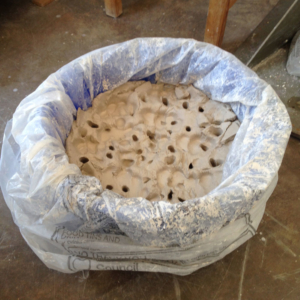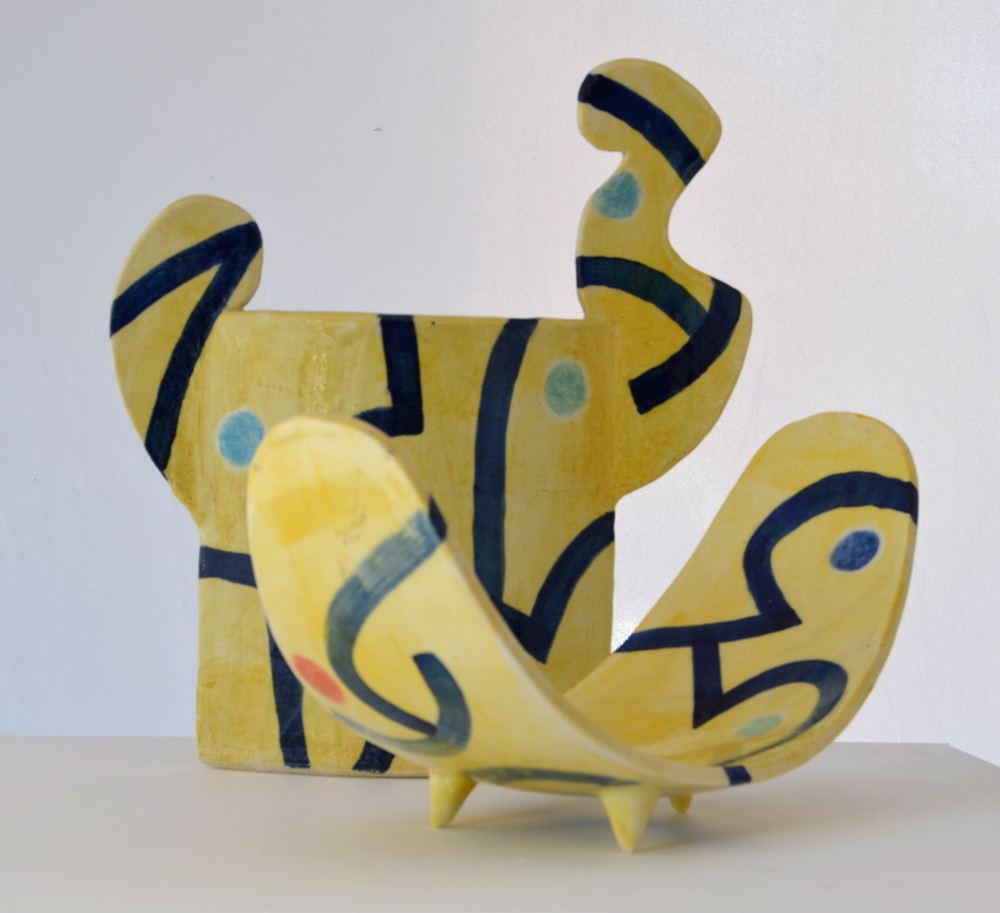
Columba Palumbus, or garden thug
Hello, everyone out there. Here we are, not waving, not drowning, not twiddling our thumbs, just plodding along and occasionally having one glass of wine too many, or watching just one more episode of Tiger King (aren’t people appalling, we say, smug in the knowledge that, of course, we wouldn’t fall for a loud-mouth narcissist), or sneaking off to buy chocolate (“sorry officer, but in my household it is considered an essential foodstuff, not a luxury”), or inventing new lyrics to “Happy Birthday” as you soap your hands for the fiftieth time in the day.

reused clay soak for Thelonious

The Great Sulk
Only recently have Valentines Clay in Stoke started to take orders, though delivery is not going to be immediate, so, for now, we are down to half a bucket of used and left-over stoneware clay that has been soaking in water. Shortly it will be just the right consistency for pugging, subsequently negotiations have begun with Thelonious Pugmill (who some of you may remember from a previous blog) to begin work tomorrow. He has been sulking these few weeks because he was refused permission to be furloughed, but there is confidence that by playing him the complete works of Steely Dan he will be persuaded. This one is his favourite; just click here. I have never met Napoleon, But I plan to find the time.

Thelonious in happier times
Once the clay has gone through Thelonious, it’ll be as good as new and ready to be slabbed and shaped into something that vaguely resembles a vase. As you can see, new approaches, inspired by Alison Britton’s work, though yet to be painted and glazed.

stoneware fandango
By the way, unsure about how long the covid virus’s ability to stick to surfaces lasts, we put everything that comes in (shopping, post, deliveries, shoes, etc) in a room at the entrance. No one is sure how this helps, but if, after a couple of hours’ interrogation the object in question persuades us that it’s OK, we let it in. There is one package though that has us in a quandary. We ordered a flexible draft excluder for doors. This can be stuck on the outside of the frame so that no rain can make its way into the office (this happens when the rain is blown by wind coming from the south). The order was placed three months ago. The package arrived yesterday. It is from the epicentre of the pandemic: Hunan. Should it be boiled first? Put out in the garden for a few days? Sprayed with alcohol?*

all the way from Hunan
The weather has been kind in this part of the UK, and what with the decrease in road traffic and fewer people going to work, the relative silence seems to make the birds sing more loudly, when in fact they’ve presumably always sung their little hearts out at the same volume, only we weren’t listening.
The wood pigeons have taken over the garden, using the birdbath as their own personal swimming pool, hanging out in the porch in a challenging sort of way (you know, the “what you gonna do about it” variety), making amorous advances to each other on the garden furniture, nesting so high up in the Lawson Cypress that their droppings make a spectacular Pollockian splash when they hit the patio, the aforementioned garden furniture, the potted plants, us…though it is unfair to describe Jackson Pollock’s work as “splashes” since he was an artist who knew how to harness the energy of a dribble more than anything else. On the plus side, next time you spot a wood pigeon drinking, observe it: most birds drink by dipping their bill in water and throwing their head back to swallow. Pigeons and doves are able to immerse their beaks and can drink continuously. So perhaps they have more in common with Jackson P. than I thought.

Jackson Pigeon
Other than for shopping or visiting the pharmacy, we can only go out to take exercise, as long as we do not drive to a spot and then go for a stroll. You must start your walk from home, which is why if you are lucky enough to live in a place like Ledbury you get to appreciate such easy access to the countryside from your front door. A walk to the top of Bradlow Knoll forces you to use your lungs but rewards you with a sloping view down towards the town and towards the Cotswolds beyond. And then you head into the cool of Frith Wood and feast your eyes on bluebells and wood anemones and you remember that it is Spring, and that most people cannot stand ankle-deep in bluebells and breathe in that clean air.

Ledbury from Bradlow Knoll
Back down the hill, and depending on the time of day, you may be thinking ahead to the evening’s activities: food, drink, telly. Will there be an obesity and alcoholism problem when we eventually come out of lockdown? Will our brains have turned to mush from the indiscriminate viewing of soaps, Scandi-noir, repeats of “Dad’s Army” and cookery programmes? Well, perhaps the experience will have made us all much choosier about what goes into us – why drink a can of supermarket beer when you can get delicious locally brewed ones delivered? Why watch “Made in Chelsea” when you can get to watch National Theatre plays being streamed? Why not, ladies and gentlemen, pay that little bit extra for a unique ceramic piece with the visual impact to transform your mantelpiece? Well, I had to get that in somehow.

Monkey puzzle vase and scoop bowl
Finally, and please indulge me, if you ever want to relax and let your mind go wandering far away from earthly matters, I have a serious recommendation. I have had the record for years and occasionally lie on the floor and play it – it is transcendental and best experienced in a cathedral. Spem in Alium (Hope in any other) was written by Thomas Tallis in 1570 as a 40 part motet, in other words for 40 individual voices, to be heard “in the round”, with the choir surrounding you. I was lucky enough to go to a performance of this at the Malvern Theatre, with the singers spaced all around us. If you click here it will take you to the Byrd Ensemble singing it, but probably best purchased as a CD (the King’s College Cambridge Choir recording is best) and listened to with earphones.

Thomas Tallis
By way of contrast, back to hand washing, and those alternative lyrics when we were children:
“Happy birthday to you,
Do you live in a zoo?
You look like a monkey
And you smell like one too.”
*If in the unlikely event that you are a very young person or child reading this blog, please be assured that it is not in the least bit serious – in fact, it is very silly, and you must not take anything in it to heart, nor should you try boiling your parents’ post .

Frith Wood



























